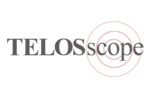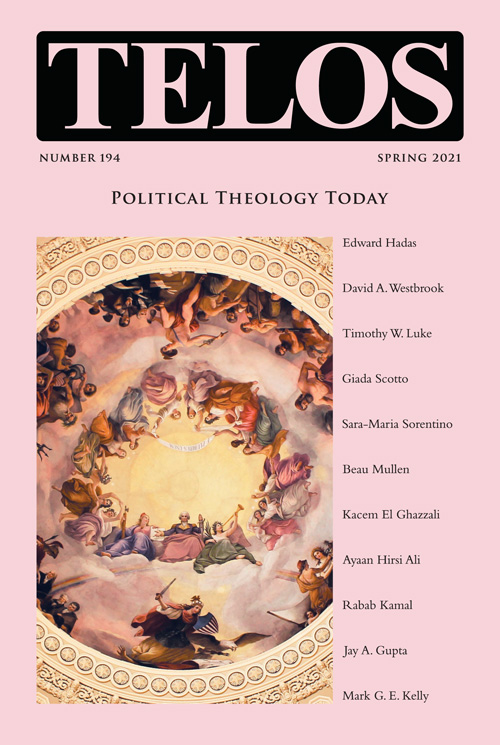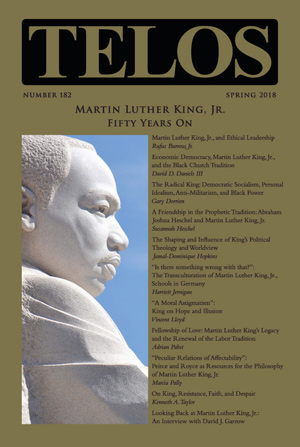In today’s episode of the Telos Press Podcast, David Pan talks with David A. Westbrook about his article “Social Capitalism: A Descriptive Sketch,” from Telos 194 (Spring 2021). An excerpt of the article appears here, and we are providing free open access to the full article at the Telos Online website. To learn how your university can subscribe to Telos, visit our library recommendation page. Print copies of Telos 194 are available for purchase in our online store.

The following interview appeared in the Welt am Sonntag. This translation is published here with permission. Wolfgang Reitzle is one of Germany’s leading business executives. Translated by Russell A. Berman, with comments here. Welt am Sonntag: Mr. Reitzle, the corona crisis robbed many Germans of their illusions about this republic. They don’t recognize their country anymore. They used to think of it as progressive, organized, digitalized, and well led. Was that image of modern Germany just a fantasy? Wolfgang Reitzle: There have been plenty of signs of a discrepancy in Germany between appearance and reality: despite a defense budget of 47 billion euros, our guns can’t shoot, our tanks can’t roll, and our airplanes can’t fly—this doesn’t seem to bother anyone here, but other countries have taken notice. Our inability to build an airport for our capital city astonished the world. Berlin, a “Failed State”? Bureaucracy, Ideology, and Global Competition—Comments on Wolfgang ReitzleWolfgang Reitzle is one of Germany’s premiere business executives, and Klaus Boldt, part of the editorial leadership of Die Welt, one of the foremost business journalists. The wide-ranging interview here points to the multiple dimensions of the problems facing Germany at the end of the Angela Merkel era. The general elections in late September are sure to lead to a new coalition government in Berlin—and a new chancellor—who will face all the problems that Reitzle diagnoses, with the possible exception of the pandemic, hopefully over by the fall, even in Europe. While the coronavirus’s economic, social, and political consequences are however sure to linger on, it figures here primarily as an example of massive government failure and the toxic mixture of bureaucracy, ideology, and incompetence that Reitzle denounces and that leads him to call Berlin “a failed state.” Those are harsh words from a prominent leader of the German business community, especially when one recalls how in the U.S. political discussion in recent years Germany has been repeatedly held up as the better alternative to the Trump administration. Not long ago the myth of Angela Merkel as the new leader of the free world circulated through the press. That once-glowing imagery has now vanished in the face of the catastrophes of the German and the EU corona response, and the prospect of continued slow economic growth, fraying infrastructure, and insufficient support for technological innovation in the country where one would least expect it. Reitzle helps us understand why. Telos 194 (Spring 2021): Political Theology Today is now available for purchase in our store. Individual subscriptions to Telos are also available in both print and online formats.
To read more in depth from Telos, subscribe to the journal here. On November 26, 2020, when international borders were still partially closed due to the global coronavirus pandemic, a new democratic and peaceful movement was taking shape in India, led by farmers. They wanted to register their protest against three contentious agricultural reform laws covering “Produce Trade and Commerce,” “Agreement of Price Assurance and Farm Services,” and an amendment in the definition of “Essential Commodities.” Thousands of men, women, and children from the farming communities of the northern states of Punjab and Haryana left their homes and fields and drove on tractors and pick-up trucks hitched with “trolleys” (trailers) to New Delhi. At the borders of the national capital of the world’s largest democratic nation, the farmers witnessed the full display of the power of their own elected federal government. Their attempts to enter the city were blocked by the deployment of a heavy police force, and the capital was closed off at several points; excavators were sent to dig up trenches, elaborate multilayered barricading was erected with massive concrete boulders generally used to prevent the impact of bombings, iron grills normally used in India to control traffic and set up temporary checkpoints were placed, covered with barbwire to assure extra security, and if all of this was not enough, water tankers were brought in to spray cold water on the farmers, who were also beaten up with lathis (batons). |
||||
|
Telos Press Publishing · PO Box 811 · Candor, NY 13743 · Phone: 212-228-6479 Privacy Policy · Data Protection Copyright © 2025 Telos Press Publishing · All Rights Reserved |
||||




